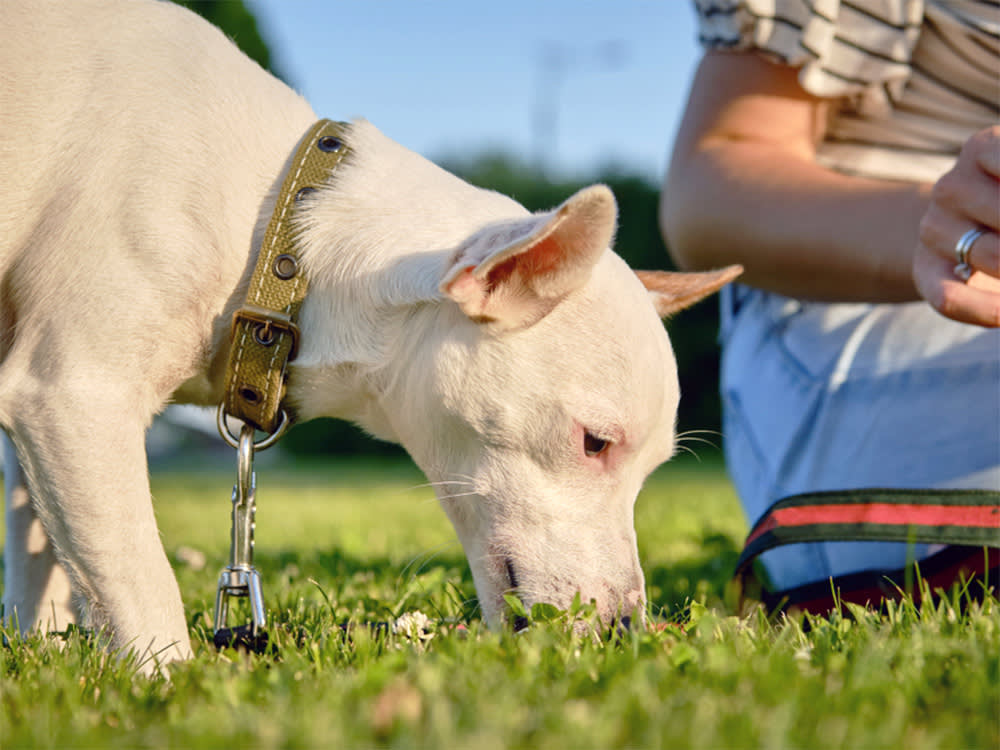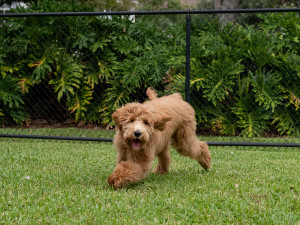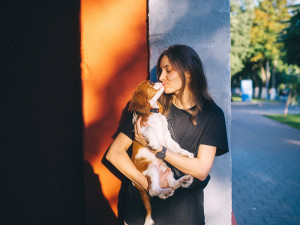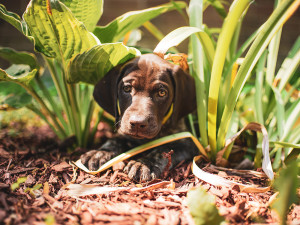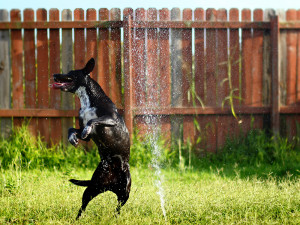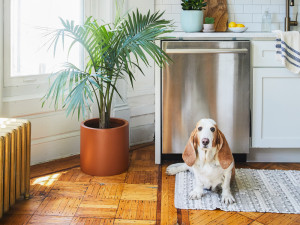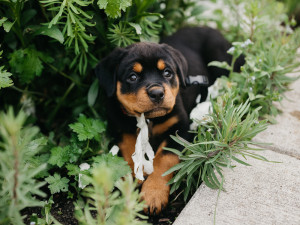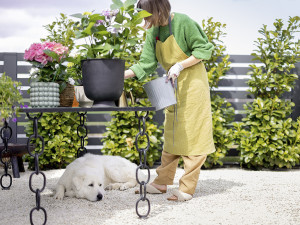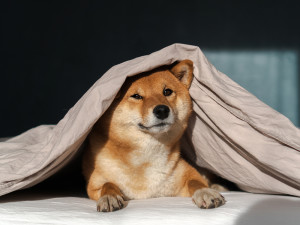Why Does My Dog Eat Dirt?
That’s not food, bud.
In This Article:
Common Reasons Dogs Eat Dirt How to Stop Your Dog From Eating Dirt Is it Normal for Dogs to Eat Dirt? When to Visit a Vet Frequently Asked Questions
Dogs are naturally curious and ready to explore the world around them, whether that’s through interacting with other dogs, other humans, or just literally sniffing out what’s going on. While for the most part this exploratory behavior is just that, to explore, sometimes it can veer into something that might need to be taken care of. Case in point: dogs and dirt.
Dog parents are very used to their precious pets eating something that they shouldn’t: a food scrap on the street, something the garbage, or even dirt. But some dogs take their dirt-eating to the extreme, which may underline other issues.
Some dogs eat dirt due to their instincts or other causes, like gastrointestinal distress, boredom, or parasites. Understand what drives your dog to eat dirt so you can address nutritional shortfalls, anxiety, lack of stimulation, or illness to curb this behavior.
How much do you spend on your pet per year?
Common reasons dogs eat dirt
1. Natural scavenging instincts
One reason why your dog continues to eat dirt might just be an extension of natural instincts, especially if they are young. Puppies are trying to explore their environment, which includes putting things that they shouldn’t into their mouths. Veterinarian Dr. Bartley Harrison says there are many reasons dogs might try eating dirt.
“There are a variety of reasons that dogs can eat dirt,” he says. “Many causes are simply behavioral, especially with puppies, who try to put everything in their mouths. Dogs may also eat dirt due to anemia (a low red blood cell count) or poor absorption of nutrients from their GI tract.”
2. Digestive discomforts or nutritional deficiencies
As Dr. Harrison mentions, many dogs might eat dirt because they are having some sort of digestive issue or nutritional deficiency. He says that the biggest cause is “anemia, which can cause an iron deficiency, would likely be the most common cause for a dog to eat dirt.” It would be worth taking your dog to the vet to get this checked out. If anemia isn’t an issue, switching a dog’s food to one with better nutrients may help or make sure they aren’t being underfed.
It could also be caused by some sort of stomach upset. Many people think dogs may eat grassopens in new tab to soothe a sour tummy, and some dogs could possibly eat dirt as a way to make themselves vomit. However, even if eating dirt gives a pup initial relief, continuing to eat dirt long-term can cause gastrointestinal problems, such as gastrointestinal blockages, consuming toxins, and abrasions to the gastrointestinal tract if there are rocks or sticks in the dirt.
3. Parasites
Eating dirt may also make your dog more susceptible to all types of parasites that hang out in the soil, such as hookworms, whipworms, giardia, and others. If your dog catches one of those parasites, there could be a whole bevy of other symptoms. Dr. Harrison mentions that pica can also be associated with some types of parasites.
“Pica has been associated with intestinal parasites in some animals,” he says. “This could be caused by blood and nutrient loss to the worms or physical discomfort and cramping in the intestines if there are a large number of worms.”
4. Pica
So, what is pica, you ask? Pica is the persistent chewing and eating of non-indigestible objects that don’t provide any nutritional value to the animal. While many only chew on those objects, some actually consume them. Pica can then cause a myriad of health issues, depending on the object.
As Dr. Harrison says, sometimes pica could be associated with a dog getting a parasite, but it can also be caused by underlying nutritional deficiencies or medical issues. However, there are also other reasons behind pica. For younger dogs, it could be a matter of teething — gnawing on a foreign object if an appropriate toy isn’t provided could help soothe their gums. For others, it could be a compulsive disorder, which may be caused by genetics. For some, it might just be a matter of boredom and anxiety.
5. Boredom and stress relief
If your dog’s dirt-eating doesn’t have any underlying medical issues, they might just need some extra activity. That might be more exercise — whether that’s a trip to the park or a long walk. Some new toys might help stimulate a pup previously focused on dirt. It could also mean the dog needs some more social interaction whether that’s with their parent, other humans, or some pet pals.
For others, it might be a sign of anxiety. Eating dirt could be a sign of separation anxiety from a dog’s parent, redirecting their stress to what they are ingesting. Carefully monitor your dog to find out what could be the source of their stress, making sure to keep track of frequency, time, and duration. Making notes of what may be ailing your pet will better help to eliminate that behavior. Also, watch how you interact with your pet daily — see if setting boundaries with your pet may help to relieve any anxiety. If none of that works, it may be worth looking into a dog trainer to help dogs with severe anxiety.
How to stop your dog from eating dirt
1. Manage compulsive tendencies
The first thing to do to keep your dog from eating dirt is to manage their tendencies to want to do so. Brittany Fulton, a professional dog trainer, says the most important first step is changing the dirt-eating habit.
“First, you’ll want to break the habit that’s started,” she says. “If there is a particular location in your yard that your dog is targeting for their dirt meals, prevent access to this area. If you cannot block the area or cover it, leash your dog each time you take them out to prevent them from returning to the crime scene.”
But it’s not as simple as just breaking the habit, Fulton explains. You’ve got to keep your dog from associating that area with their dirt diet: “Build a strong recall. Just as your dog gets to the patch of dirt that they typically eat, cue them away with your recall. Reward them with lots of praise and treats or play. Remember to practice the recall in a variety of low-challenge situations including other non-dirt-eating parts of the yard.”
If that doesn’t work, Dr. Harrison suggests a specific type of muzzle. “The quickest way to stop a dog from eating dirt is to use a basket muzzle when they’re outside,” he says. “These types of muzzles still allow dogs to sniff and pant to their heart’s content, but make it very difficult for them to put things in their mouths.”
He adds that dogs with basket muzzles on shouldn’t be left outside unsupervised and also suggests getting a trainer to help curb the behavior.
2. Adjust landscaping
Depending on the undertaking, it might be helpful to reassess the landscaping where your dog is focusing on eating dirt. You can obstruct the area that your canine pal is attracted to or add more stimulation in the yard with toys or other dog-safe things that might help sway them from their previous preference.
3. Adjust diet
Many dogs who are consuming dirt might be lacking sodium, iron, calcium and gaining that from dirt instead. It could be worth talking to your veterinarian about food recommendations that can better provide your dog with all its proper nutrients. Dogs who are consuming dirt may be lacking in certain nutrients (especially minerals like iron) and trying to get that from dirt instead. Make sure that your dog's food has a statement saying it contains the nutrients recommended by AAFCO for a complete and balanced diet
4. Add stimulation
Making sure there are new and fun things for your dog to do can be important in helping a pup to stop eating dirt. Fulton says that it might be helpful to treat it like a new game. “Turn the yard time or walks into a new experience. Start a new habit. Maybe you toss the ball a few times as soon as you let your dog into the backyard.”
She suggests adding some “Find It” games into your walk to create a new mindset. To play Find It, toss food onto the ground and say the cue. “Teach them that when you say ‘find it,’ it means there’s some food available, and they should sniff it out.”
Is it normal for dogs to eat dirt?
It can be normal for a dog to eat a little bit of dirt, but as Dr. Harrison says, anything that gets excessive is something to watch out for.
Is it dangerous for dogs to eat dirt?
“A little bit of dirt is unlikely to cause problems for most dogs, but eating excessive amounts of dirt can result in a stomach upset, intestinal blockage, or constipation.”
When to visit a vet
Like Dr. Harrison says, seeing your canine eating excessive amounts of dirt can cause health issues and is the time to take your pet pal to the veterinarian: “If you notice your dog eating dirt frequently, it’s a good idea to check in with your vet to make sure there’s no evidence of parasites, anemia, liver issues, or another systemic issue that could be causing problems.”
FAQs (People also ask):
What is a dog lacking when they eat dirt?
A dog could be lacking nutrients when consuming dirt and may need to change their diet to food with more nutrients.
What are the side effects of a dog eating dirt?
Side effects of a dog eating dirt can range from an upset stomach, gastrointestinal issues, parasites, or other more severe health issues.
What should I feed my dog to help them stop eating dirt?
Making sure your pup has a diet filled with proper nutrients is a good way to curb dirt-eating.
